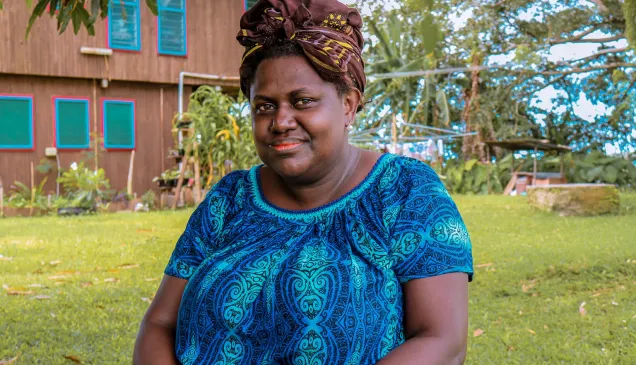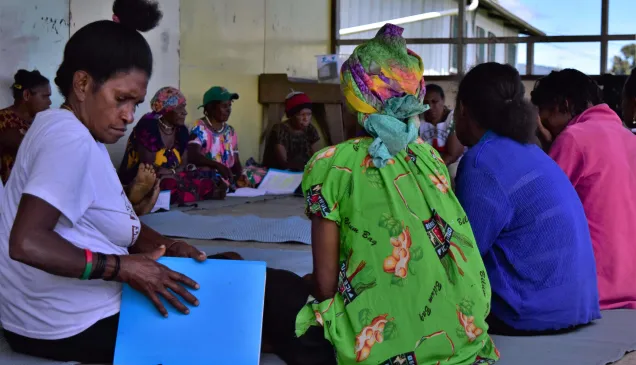Mental health in the Pacific – let’s talk about it

October 10th marks World Mental Health Day and the theme for this year is “Mental Health in an unequal world”.
For most Pacific Island Nations, the global commemorative event hits closer to home as the Covid-19 pandemic has resulted in unemployment for many Pacific Islanders, putting more pressure on breadwinners to find other alternatives in feeding their families.
Though media organizations have reported on increases in number of people accessing mental health services, it also highlights an alarming spike in family violence and higher suicide rates across the Pacific Island Nations. Recent statistics in Fiji reveal that due to Covid-19 pandemic, from January to July this year, 47 suicide cases and 65 attempted suicide cases were recorded in the country.
Here in the Pacific, the International Committee of the Red Cross (ICRC) funds communication programs for 12 National Red Cross Societies – those in Cook Islands, Fiji, Kiribati, Marshall Islands, Micronesia, Palau, Papua New Guinea (PNG), Samoa, Solomon Islands, Tonga, Tuvalu and Vanuatu. This funding enables these Red Cross Societies to develop and disseminate key messages on mental health and psychosocial support (MHPSS) on social media and throughout their communities.
The ICRC has identified a need for MHPSS messaging and support services to those affected by COVID-19 in PNG. ICRC regularly offers technical and material support for the Family Support Centres (FSCs) in order to ensure quality MHPSS services for the beneficiaries. Between January and September, the FSCs received more than 2000 victims of violence and sexual violence. Also, ICRC trained FSC health staff to provide more than 400 information sessions for the benefit of more than 8017 participants. The information sessions tackled several topics such as psychosocial impact of violence and sexual violence, FSC services, stress related to COVID-19 and prevention measures. Outreach activities that were performed by the FSC teams contributed to progressively increase the number of patients, especially in the newly supported FSCs.
There is no shame in taking care of your mental health.
It’s okay to seek help, especially if you live in conflict-affected areas.#WorldMentalHealthDay pic.twitter.com/9mKi7aEBYM— ICRC Asia-Pacific (@ICRC_AsiaPac) October 8, 2021
Furthermore, the ICRC trained Village Birth Attendants (VBAs) organized more than 300 information sessions for the benefit of more than 2000 participants within their respective community. The aim of these sessions is to inform the community members on the medical and psychosocial impact of violence and sexual violence, ways to cope with stress generated by violence and referral pathways.
In addition, the ICRC trained 23 VBAsto conduct psychosocial support groups for individuals who have experienced violence or sexual violence in their lives. The goal of this activity was to help them develop their own coping mechanisms to improve their psychosocial well-being.
The VBAs concluded 06 cycles of support involving a total number of 70 participants. In addition to the mentioned support, ICRC in its Covid-19 response also trained 10 Christian helpers on the psychosocial impact of COVID-19 pandemic and basic psychosocial support skills. The objective of this training was to help those actors providing basic psychosocial support for the community whose members were physically and emotionally affected by COVID-19 pandemic, inform them about the potential psychosocial impacts of the pandemic and coping mechanisms. Additionally, the training introduced ways to emotionally protect oneself as a health/mental health and psychosocial support provider and avoid being overwhelmed by stress.
ICRC continues to develop programmes that build up local capacity to stabilize and improve the mental health and ensure the emotional well-being of individuals across all communities. This is even more needful at the time of the pandemic.
With the pandemic imposing an extraordinary level of stress and suffering on communities around the world, this year's World Mental Health Day is an opportunity for us to highlight the importance of MHPSS, and the need for everyone to be able to access the required support and care.
By Vincent Ochilet
ICRC Head of Regional Delegation in the Pacific



